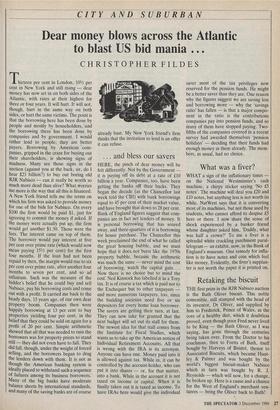... and bless our savers
HERE, the pinch of dear money will be felt differently. Not by the Government — it is paying off its debt at a rate of £10 billion a year. Companies, too, have been getting the banks off their backs. They began the decade (as the Chancellor last week told the CBI) with bank borrowings equal to 45 per cent of their market value, and have brought that down to 28 per cent. Bank of England figures suggest that com- panies are in fact net lenders of money. It is personal borrowing that has soared away, and three-quarters of it is borrowing for house purchase. The Chancellor this week proclaimed the end of what he called the great housing bubble, and we must hope that it does not burst like the 1970s property bubble, because the arithmetic was much the same — never mind the cost of borrowing, watch the capital gain.... Now there is no choice but to mind the cost: Neil Kinnock has labelled it as a Tory tax. It is of course a tax which is paid not to the Exchequer but to other taxpayers — and more numerous taxpayers, too, since the building societies need five or six depositors for every home loan borrower. The savers are getting their turn, at last. They can now take for granted that the next budget will set out its stall for them. The newest idea for that stall comes from the Institute for Fiscal Studies, which wants us to take up the American notion of Individual Retirement Accounts. All that is wrong with the IRA is its acronym. Anyone can have one. Money paid into it is allowed against tax. While in, it can be controlled by the account-holder, who can put it into shares — or, for that matter, into a bank. While in the account it is not taxed on income or capital. When it is finally taken out it is taxed as income. To have IRAs here would give the individual saver most of the tax privileges now reserved for the pension funds. He might be a better saver than they are. One reason why the figures suggest we are saving less and borrowing more — why the 'savings ratio' has fallen — is that a major compo- nent in the ratio is the contributions companies pay into pension funds, and so many of them have stopped paying. Two- fifths of the companies covered in a recent survey had awarded themselves 'pension holidays' — deciding that their funds had enough money in them already. The mem- bers, as usual, had no choice.


































































 Previous page
Previous page